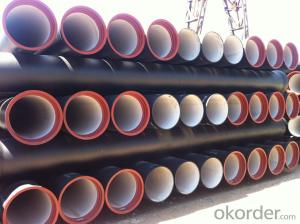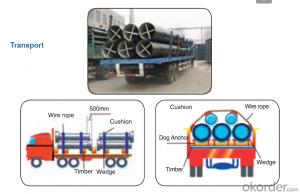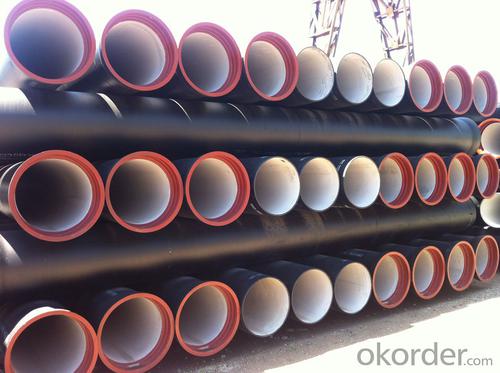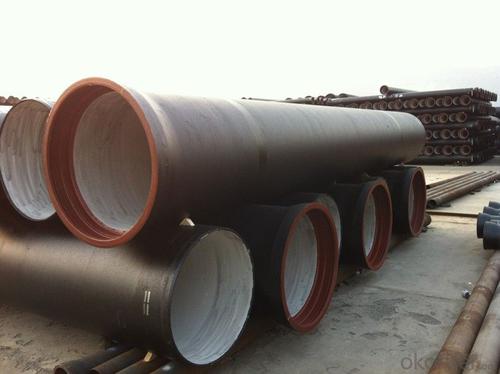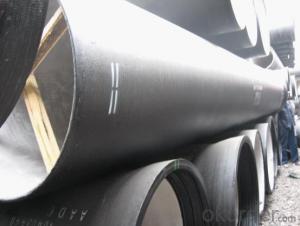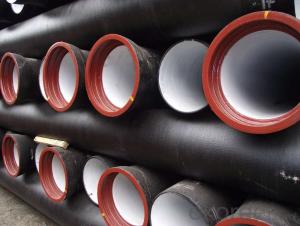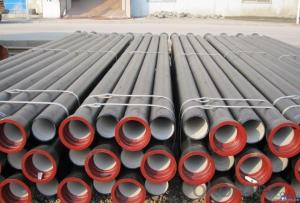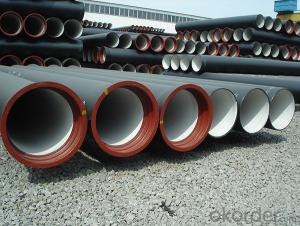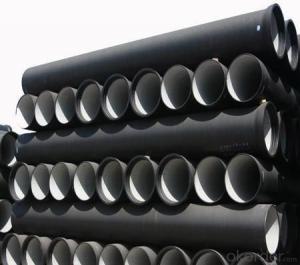Duct Iron Pipe DI Pipe ISO 2531 DN 80-2000mm K9
- Loading Port:
- Tianjin
- Payment Terms:
- TT OR LC
- Min Order Qty:
- 100 m
- Supply Capability:
- 100000 m/month
OKorder Service Pledge
OKorder Financial Service
You Might Also Like
Specification:
1. size : DN80-DN2000 available with PN16 or PN10 or PN25 flanges
2.Standard : ISO2531/EN545/EN598/AWWA standard
3. WRAS Potable Water FBE Internal Lining
4.Material : Ductile iron
5.Technical: Casting
6. Type: Socket / flange PN10 / PN16 / PN25
7. Length=6m, 5.8m
8. Coating: Fusion bonded epoxy to 300 microns Dry Film Thickness
Portland cement lining internally and zinc-rich paint with not less than 70 microns bitumen externally
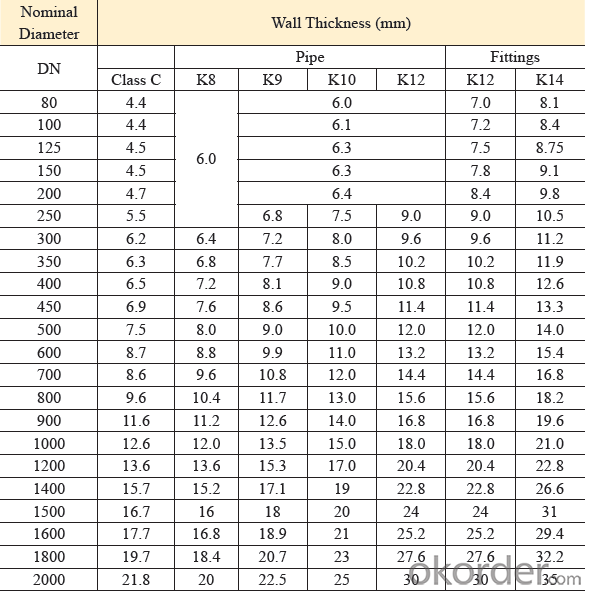
Quality:
ISO 2531 or EN 545 Standard K9 Class, K12 Class
1. ISO 9001 Certificate
2. ISO 2531 & EN 545 Certificate
3. WRAS Potable Water Certificate for FBE Internal Lining
4. WRAS EPDM Rubber Gasket or NBR Rubber Gasket
5. DN80mm - DN2000mm
6. Black Bitumen or Blue FBE / Epoxy Coating
7. Lengh = 6m or cut into 5.6m, 5.7m, 5.8m
8. Client's Brand Customization Allowable
9. Container or Bulk Loading / Shipping
10.Delivery within one Month or According to Client's Order Quantity
11. Support Client or The Third Party Inspection before Shipment
Standard Lining and Coating:
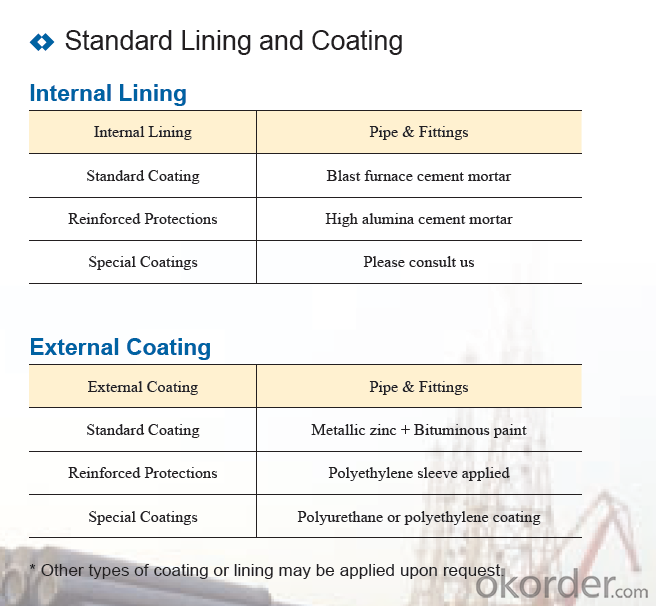
Transport:
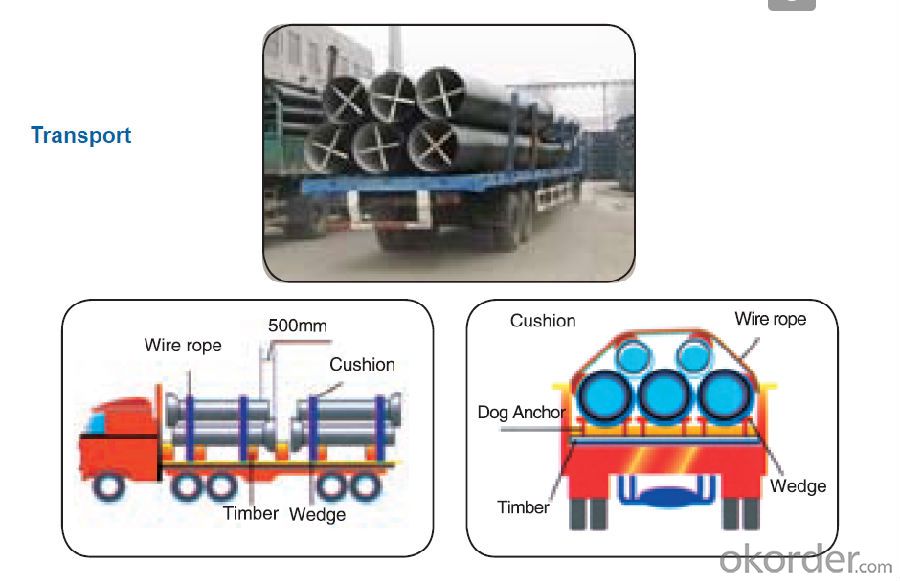
- Q: Can ductile iron pipes be used for irrigation canal lining?
- Yes, ductile iron pipes can be used for irrigation canal lining. Ductile iron pipes are known for their strength, durability, and resistance to corrosion, making them suitable for various applications including irrigation systems. They can withstand the pressure of water flow and provide a reliable and long-lasting solution for canal lining in irrigation projects.
- Q: How does ductile iron pipe perform in areas with high soil contamination?
- Due to its inherent strength, durability, and corrosion resistance properties, ductile iron pipe is highly effective in areas with high soil contamination. The material used in manufacturing these pipes is highly resistant to chemical attack, making it suitable for handling various types of contaminated soils, including those with high levels of acids, alkalis, and other corrosive substances. The corrosion resistance of ductile iron pipes is primarily due to their protective internal and external linings. These linings are designed to prevent contact between the pipe material and the surrounding soil or fluids, acting as a barrier that prevents the penetration of corrosive elements and reduces the risk of pipe degradation or failure. Additionally, external coatings or cathodic protection systems can further enhance the resistance of ductile iron pipes to soil contamination, extending their service life. Compared to materials such as steel or concrete, ductile iron pipes offer significant advantages in areas with high soil contamination. Their high strength enables them to withstand external loads imposed by the contaminated soil, reducing the risk of structural failure or deformation. Furthermore, the inherent flexibility of ductile iron allows it to absorb ground movements or settlement without compromising its integrity, making it a reliable choice for areas prone to soil instability or shifting. Moreover, the smooth internal surface of ductile iron pipes minimizes friction and maintains efficient flow rates, even in the presence of contaminants. This is particularly important in areas with high soil contamination, where debris or sedimentation can accumulate and hinder fluid flow. The smooth bore of ductile iron pipes reduces the risk of clogging and ensures the continuous and reliable conveyance of fluids, even in challenging soil conditions. In conclusion, ductile iron pipe is an excellent choice for areas with high soil contamination. Its exceptional corrosion resistance, strength, flexibility, and smooth internal surface make it a reliable and durable solution for conveying fluids in these challenging environments.
- Q: Are ductile iron pipes suitable for gravity sewer systems?
- Yes, ductile iron pipes are suitable for gravity sewer systems. Ductile iron pipes have high strength, durability, and flexibility, making them an excellent choice for underground sewer networks. They can withstand the pressure and weight of the soil above them, making them ideal for gravity flow systems where wastewater flows naturally due to gravity. Additionally, ductile iron pipes have a long lifespan and are resistant to corrosion, making them a reliable and cost-effective solution for gravity sewer systems.
- Q: Water supply pipe is ductile iron, then it's fittings and valves and other parts must be ductile iron?
- The pipe material does not determine the valve material, the valve is generally based on several pressure temperature rating, medium condition and velocity, the valve must play a role as valve material, such as wear resistance, corrosion resistance, and so on,
- Q: What are the typical joint restraint requirements for ductile iron pipes in seismic zones?
- In seismic zones, the typical joint restraint requirements for ductile iron pipes are designed to ensure the structural integrity and prevent displacement or separation of the pipes during seismic events. These requirements are crucial to maintain the reliability and functionality of the pipeline system. One common joint restraint requirement for ductile iron pipes in seismic zones is the use of flexible or mechanical joint systems. Flexible joints, such as rubber gasket joints, can absorb and accommodate the movement caused by seismic activity. These joints allow for axial movement, angular deflection, and expansion/contraction of the pipes, reducing the risk of pipe failure or damage. Another important requirement is the use of adequate anchoring systems. This involves securing the pipes to the surrounding structures or embedding them in concrete thrust blocks to prevent excessive movement or displacement during seismic events. Anchoring systems help distribute the forces generated by the earthquake and minimize the risk of pipe separation or breaking. Additionally, seismic design standards often require the use of seismic restraints, such as seismic joint restraints or bracing systems, to further enhance the stability and integrity of the ductile iron pipes. These restraints are designed to limit the movement of the pipes in specific directions, reducing the potential for damage and maintaining the overall system performance. It is important to note that the specific joint restraint requirements for ductile iron pipes in seismic zones may vary depending on local building codes, seismic activity levels, and engineering considerations. It is crucial to consult the relevant regulations and work with experienced professionals in the design and installation process to ensure compliance with the necessary requirements for seismic resistance.
- Q: Are ductile iron pipes suitable for underground parking structures?
- Yes, ductile iron pipes are suitable for underground parking structures. They are strong, durable, and resistant to external pressures, making them ideal for use in underground environments where they can withstand heavy loads and potential ground movements. Additionally, ductile iron pipes have excellent corrosion resistance, ensuring long-term performance and minimal maintenance in underground parking structures.
- Q: Can ductile iron pipes be used for high-pressure applications?
- Yes, ductile iron pipes can be used for high-pressure applications. Ductile iron is a strong and durable material that can withstand high pressure and loads. It has excellent mechanical properties, including high tensile strength and impact resistance, making it suitable for various applications, including water and wastewater systems, oil and gas pipelines, and industrial processes. Additionally, ductile iron pipes have a high resistance to corrosion and abrasion, further enhancing their suitability for high-pressure environments. However, it is essential to consider the specific requirements and design factors of the application to ensure that the ductile iron pipes meet the necessary standards and specifications for the desired pressure range.
- Q: How much is the installation cost of the ductile iron tube?
- From the hydraulic performance, because ductile pipe specifications generally refers to the inner diameter of PE pipe diameter specifications generally refers to the same specifications, because under the condition of ductile pipe can achieve greater runoff; from the installation and maintenance cost, ductile pipe have more favorable price. The inner wall of zinc spray, anti-corrosion materials such as cement mortar.
- Q: What are the advantages of using ductile iron pipes over other materials?
- Using ductile iron pipes instead of other materials offers several advantages. To begin with, ductile iron pipes have a higher level of strength and durability compared to materials like PVC, HDPE, or concrete pipes. They possess a high tensile strength, enabling them to withstand greater pressure and handle heavy loads without cracking or breaking. This makes them suitable for a range of applications, including water and sewage systems, as well as industrial pipelines. Additionally, ductile iron pipes exhibit excellent resistance to corrosion. They typically feature a protective coating, such as zinc or epoxy, which prevents the formation of rust and extends their lifespan. This makes them ideal for underground installations or areas with aggressive soil conditions or corrosive substances. Furthermore, ductile iron pipes offer flexibility. They can be manufactured in various lengths, diameters, and angles, allowing for easy installation and adaptation to different project requirements. Moreover, their flexibility enables them to withstand ground movements, such as settlement or seismic activities, without causing significant damage. Moreover, ductile iron pipes have a smooth internal surface, which reduces friction and enhances flow efficiency. This results in reduced energy consumption for pumping systems and lower maintenance costs. Additionally, the smooth surface minimizes the risk of deposits or clogs, ensuring a consistent and uninterrupted flow of fluids. Lastly, ductile iron pipes boast a long service life. With proper installation and maintenance, they can last for over 100 years. This longevity not only reduces the need for frequent replacements but also provides a sustainable and cost-effective solution for infrastructure projects. In conclusion, the utilization of ductile iron pipes offers numerous advantages over other materials. These include superior strength, corrosion resistance, flexibility, a smooth internal surface, and a long service life. These qualities make them a reliable choice for various applications, providing efficient and durable solutions for water, sewage, and industrial pipelines.
- Q: Can ductile iron pipes be used for marine applications?
- Yes, ductile iron pipes can be used for marine applications. Ductile iron has excellent corrosion resistance properties, making it suitable for use in marine environments where exposure to saltwater and other corrosive elements is common. Additionally, its high strength and durability make it a reliable choice for various marine applications such as seawater intake and discharge systems, offshore platforms, and marine pipelines.
Send your message to us
Duct Iron Pipe DI Pipe ISO 2531 DN 80-2000mm K9
- Loading Port:
- Tianjin
- Payment Terms:
- TT OR LC
- Min Order Qty:
- 100 m
- Supply Capability:
- 100000 m/month
OKorder Service Pledge
OKorder Financial Service
Similar products
Hot products
Hot Searches
Related keywords
